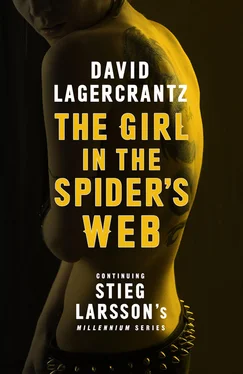Her sensational decrypted document had allowed him to unravel the whole story, and had even persuaded Needham and the head of Solifon, Nicolas Grant, to give him more details. But he had heard from Salander only once since then: when he had interviewed her — to the extent that was possible — over the Redphone app about what had happened at the summer house out on Ingarö.
That was a week ago now and Blomkvist had no idea what she thought of his article. Maybe she was angry that he had dramatized it too much — he had had no choice but to fill in the blanks around the meagre answers she gave. Or perhaps she was furious because he had not mentioned Camilla by name but had simply referred to her as a Swedish — Russian woman known as Thanos. Or else she was disappointed that he had not taken a harder line across the board.
It was impossible to know. Things were not improved by the fact that Chief Prosecutor Ekström really did appear to be considering a case against Salander: unlawful deprivation of liberty and seizure of property were the charges he was trying to cobble together.
Eventually Blomkvist got fed up with it all and left the party without saying goodbye. The weather was awful and for lack of anything better to do he scrolled through his text messages. There were congratulations and requests for interviews and a couple of indecent proposals. But nothing from Salander. He switched off his mobile and trudged home with surprisingly heavy steps for the man who had just pulled off the scoop of the century.
Salander was sitting in Fiskargatan on her red sofa, gazing emptily out at Gamla Stan and Riddarfjärden. It was a little over a year since she had started the hunt for her sister and her father’s criminal legacy, and she had to admit to her success on many counts.
She had tracked down Camilla and dealt the Spiders a serious blow. The connections with Solifon and the N.S.A. had been severed. Ivan Gribanov, the Duma member, was coming under tremendous pressure in Moscow, Camilla’s hit man was dead and her closest henchman Jurij Bogdanov and several other computer engineers were wanted by the police and forced to go underground. But Camilla was alive out there somewhere. Nothing was over. Salander had only winged her quarry and that was not enough. Grimly she looked down at the coffee table, where a packet of cigarettes and her unread copy of Millennium lay. She picked up the magazine and put it down again. Then she picked it up once more and read Blomkvist’s report. When she reached the last sentence she stared for a while at the new photograph next to his byline. Then she jumped to her feet and went to the bathroom to put on some make-up. She pulled on a tight black T-shirt and a leather jacket and went out into the December evening.
She was freezing. It was crazy to be wearing so little, but she did not care. She cut down towards Mariatorget with quick steps, turned left into Swedenborgsgatan and walked into a restaurant called Süd, where she sat down at the bar and alternated between whisky and beer. Since much of the clientele came from the world of culture and journalism, it was hardly surprising that many of them recognized her. Guitarist Johan Norberg, for example, who wrote a regular column for We and was known for picking up on small yet significant details, observed that Salander was not drinking as if she enjoyed it, but rather as if it she had to get it out of the way.
There was something very determined about her body language, and a cognitive behavioural therapist who happened to be sitting at a table further in even wondered if Salander was aware of anyone else in the restaurant. She hardly looked out over the room and seemed to be preparing herself for some kind of operation or action.
At 9.15 she paid in cash and stepped into the night without a word or gesture.
Despite the cold, Blomkvist walked home slowly, deep in gloom. A smile only crossed his lips when he ran into some of the regulars outside the Bishops Arms.
“So you weren’t washed up after all!” Arne, or whatever his name was, bellowed.
“Maybe not quite yet,” Blomkvist said. For a moment he considered having a last beer inside and chatting with Amir.
But he felt too miserable. He wanted to be alone, so he carried on the entrance door of his building. On the way up the stairs he was overcome by a vague sense of unease, maybe as a result of all he had been through. He tried to dismiss it, but it would not go away, especially when he realized that a light had blown on the top floor. It was pitch black up there.
He slowed his steps and sensed a movement. There was a flicker, a weak sliver of light as if from a mobile, and a figure like a ghost, a slight person with dark flashing eyes could be made out standing in the stairwell.
“Who’s that?” he said, frightened.
Then he saw it was Salander.
He brightened at first and opened his arms, but she looked furious. Her eyes were rimmed with black and her body seemed coiled, as if prepared for an attack.
“Are you angry with me?” he said.
“Quite.”
“Why is that?”
Salander took a step forward, her face shining and pale, and he remembered her gunshot wound.
“Because I come to visit, and there’s no-one at home,” she said, and he walked towards her.
“That’s a bit of a scandal, isn’t it?” he said.
“I’d say so.”
“What if I ask you in now?”
“Then I suppose I’ll have to accept.”
“In that case, welcome,” he said, and for the first time in ages a broad smile spread across his face.
A star fell outside in the night sky.
A Letter to my Readers
by David Lagercrantz
I miss those early hours, four in the morning, when Stockholm was silent and my family were still asleep: I would drink my espresso and sit down at my computer and write as if my life depended on it.
True, it wasn’t always easy, but sometimes I even miss that feverish intensity which occasionally bordered on terror — the terror of not being worthy of Stieg Larsson’s legacy.
That concern was what drove me, and it’s safe to say it was Lisbeth Salander who terrified me most. How could I portray such an iconic character without disappointing people? I remember going in too heavy-handed at first. It was as if I wanted to put too much in, so I spent a great many hours cutting and toning things down. The main things I removed were emotions. Sentimentality and melodrama don’t suit Lisbeth.
Her feelings should merely be glimpsed between the lines, and I realised she’s at her best in action, when she’s fighting as the underdog. If I could just find the right scenes, she’d come to life. But there was still one problem that took me a long time to figure out: how does Lisbeth Salander remember?
You know, it’s not just Lisbeth’s personality that makes her such an amazing character. Just like Batman or Superman or any other great superhero, she’s got her own mythology which is a crucial element of her explosive force. I realised early on I wanted to show that and develop it. So I needed to go back to her childhood, when her malevolent father, Alexander Zalachenko, abused and raped her mother, and Lisbeth vowed to take revenge. But I realised I would kill off some of the mystique if I had her recall those incidents herself. The chain of events seemed stronger if they were seen from outside, with just hints of her rage and pain.
It felt like I needed a filter. I also noticed that Stieg Larsson had wrestled with this issue himself: he almost always has the old lawyer Holger Palmgren, Lisbeth’s former guardian, recount her childhood. Of course, that’s a classic trick. Mythologised genius figures in literature are often best observed from a certain distance. You need a Dr Watson to create the myth and maintain the mystery around its power. From the protagonist’s point of view, most things are just logical and self-evident, but when the same process is observed by someone else, it helps us understand what’s so remarkable about it. It helps us to feel amazed. I decided to use the same devices as Stieg Larsson. And yet I refused to surrender completely.
Читать дальше












